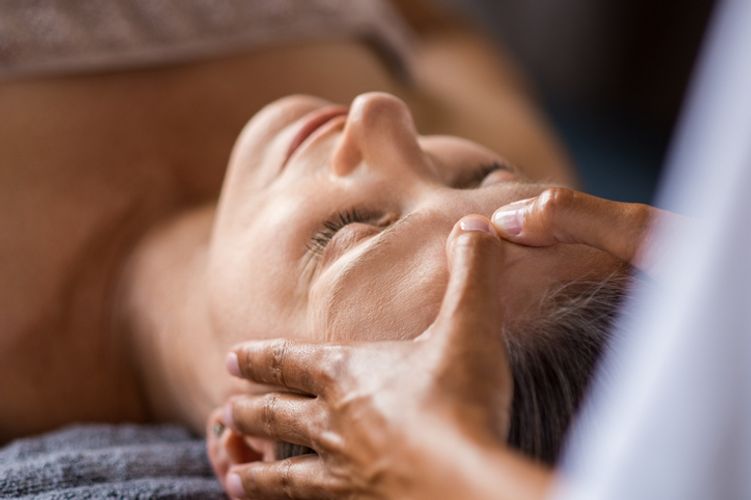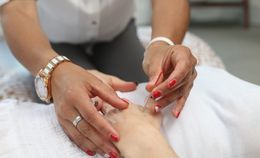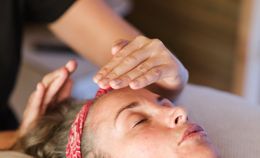Nearly everyone enjoys a great massage. But aside from its reputation as a pampering luxury service, massage is increasingly attracting attention for its effectiveness in improving health and wellness. Scientific evidence is mounting showing the benefits of massage therapy in treating a wide range of health conditions, from alleviating pain symptoms to reducing the negative impacts of chronic stress on the body.
How much do you know about the health benefits of massage therapy? Read on to learn about some of the lesser-known ways a massage therapy program can improve health and well-being.
1. Massage reduces the impact of chronic stress, including cancer, heart attack & stroke
Many people cite stress reduction as a top reason to get a massage. There's a popular view of massage therapy as a tool to help us slow down and relax amid our chaotic, multi-tasking lives. But we often throw around the term "stress" casually, and talk about our ways of dealing with it as a matter of indulgence or mere personal preference. Some of us like a cocktail or a pedicure to unwind, others might prefer a massage. These options and many others are all seen as ways to create a moment of self-indulgence to counteract the seemingly endless demands of hectic modern work and family lives.
In this context, it's easy to lose sight of the real, serious impact chronic stress can have on our physical health. But chronic stress is risky business - it's been linked to a range of serious health problems. Chronic stress can increase inflammation and reduce immune system functioning, putting patients at increased risk for cancer, cardiovascular dysfunction and diabetes.1
This puts the well-known benefits of massage therapy for stress relief2 in a more serious light. For example, massage therapy has been shown to reduce blood pressure, heart rate and inflammation in women with hypertension3 through its effectiveness in promoting relaxation. A regular massage therapy program can be an important way to avoid chronic stress and reduce your risk for the serious health problems it can cause or exacerbate.
2. Massage reduces the risk of serious psychiatric disorders
Just as a regular massage therapy program has been shown to be effective in counteracting the physical ill health effects of chronic stress, it's been shown to be an effective method for counteracting the psychological toll of chronic stress as well. Chronic stress has been implicated in increased risk of serious psychiatric disorders, including anxiety and depression4. Over time, chronic stress can cause physical changes to the brain that increase patients - vulnerability to psychiatric and behavioral problems.
Uncontrolled chronic pain can be another risk factor for psychiatric disorders.5 Massage therapy is of course well-known for its effectiveness in pain relief,6 including its usefulness in treating low-back pain, arthritis pain, joint pain, neck pain, fibromyalgia,7 tension headaches,8 migraines, muscle spasms and more. Taking chronic pain seriously and reducing its symptoms through regular massage therapy can also be an effective way to reduce the risks of psychiatric problems caused by chronic pain.
Research supports massage for mental health and well-being generally,9 and as a specific treatment for symptoms of anxiety10 and depression.11
3. Massage helps premature babies gain weight and thrive
One of the most common goals for neonatal intensive care units is to help babies born prematurely gain weight. Weight gain indicates growth and overall healthy development, and is one important criteria allowing a prematurely born infant to be discharged from the hospital. One study showed that preterm newborns who received 5-10 days of therapeutic massage treatment experienced 21-48% greater increase in weight gain than preterm infants not treated with massage. Several clinical trials showed improved weight gain meant preterm babies treated with massage were also discharged from the hospital much sooner.1213 Massage therapy has proven to be a powerful tool in helping premature babies thrive.
4. Massage relieves digestive problems
Massage therapy is well-known for its ability to decrease muscle tension and increase blood flow. These can be helpful in alleviating uncomfortable digestive problems like bloating and constipation, so massage therapy is increasingly being explored as a treatment for these conditions. Abdominal massage is a low-risk treatment (that can even be self-administered!) to increase circulation to that area of the body and help relax the muscles that aid in the digestive process.1415
5. Massage improves sleep
Like chronic pain and chronic stress, a chronic sleep deficit can put people at increased risk for a variety of serious health problems, both physical and psychological. These include obesity and hypertension, and studies show widespread impacts to public health, like increased auto accidents.16
Massage therapy is increasingly being turned to as a great drug-free, low-risk treatment option for anyone suffering from insomnia.17 Massage can help promote relaxation as well as reduce distractions caused by pain and stress that can interfere with healthy sleep patterns.
The Bottom Line
If you or someone you know is suffering from any of the health problems mentioned, talk to a licensed massage therapist about how they can help. A professional massage therapist can help you identify the type of massage best suited to your health and wellness goals, and design an effective program to support your mental and physical well-being.
References:
1 "The Effects of Chronic Stress on Health: New Insights into the Molecular Mechanisms of Brain-Body Communication": https://www.ncbi.nlm.nih.gov/pmc/articles/PMC5137920/
2 "Massage Therapy Can Relieve Stress": https://www.amtamassage.org/statement2.html
3Effects of Swedish Massage Therapy on Blood Pressure, Heart Rate, and Inflammatory Markers in Hypertensive Women https://www.ncbi.nlm.nih.gov/pmc/articles/PMC3759268/
4 "The Effects of Chronic Stress on Health: New Insights into the Molecular Mechanisms of Brain-Body Communication": https://www.ncbi.nlm.nih.gov/pmc/articles/PMC5137920/
5 "The Psychological Impact of Chronic Pain": https://www.floridamedicalclinic.com/blog/psychological-impact-chronic-pain/
6 "Massage Can Aid in Pain Relief": https://www.amtamassage.org/statement6.html
7 "Massage Therapy as Beneficial Part of Integrative Treatment Plan for Fibromyalgia": https://www.amtamassage.org/approved_position_statements/Massage-Therapy-as-Beneficial-Part-of-Integrative-Treatment-Plan-for-Fibromyalgia.html
8 "Massage Can Be Effective for Tension Headaches": https://www.amtamassage.org/approved_position_statements/Massage-Can-Be-Effective-for-Tension-Headaches.html
9 "Research Roundup: Massage for Mental Health and Wellness": https://www.amtamassage.org/research/Massage-Therapy-Research-Roundup/Research-Roundup--Volume-4.html
10 "Massage Therapy for Anxiety": https://www.amtamassage.org/approved_position_statements/Massage-Therapy-for-Anxiety.html
11 "Massage Can Reduce Symptoms of Depression": https://www.amtamassage.org/approved_position_statements/Massage-Can-Reduce-Symptoms-of-Depression.html
12 "Preterm Infant Massage Therapy Research: A Review": https://www.ncbi.nlm.nih.gov/pmc/articles/PMC2844909/
13 "The effects of massage therapy in hospitalized preterm neonates: A systematic review": https://www.sciencedirect.com/science/article/abs/pii/S0020748917300433
14 "Why You Should Massage Your Stomach and How to Do It": https://www.healthline.com/health/stomach-massage#takeaway
15 "Does Abdominal Massage Relieve Constipation?": https://www.nursingtimes.net/clinical-archive/continence/does-abdominal-massage-relieve-constipation/5027718.article
16 "Sleep Disorders and Sleep Deprivation: An Unmet Public Health Problem": https://www.ncbi.nlm.nih.gov/books/NBK19961/
17 "Massage therapy for a better night's sleep": http://www.sleepreviewmag.com/2014/05/massage-therapy-sleep/










